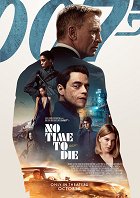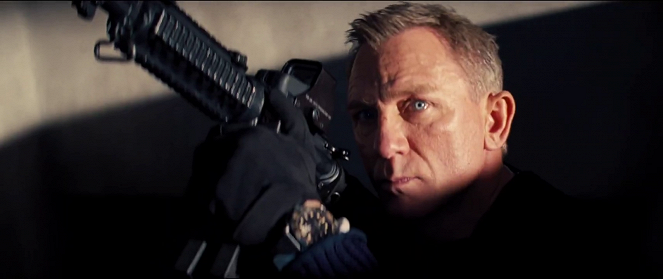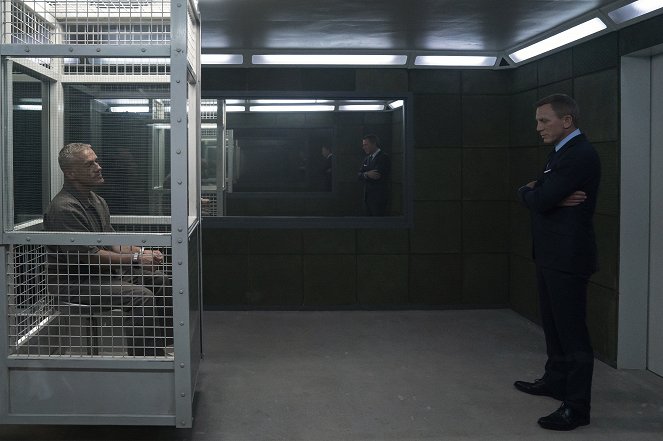Directed by:
Cary Joji FukunagaCinematography:
Linus SandgrenComposer:
Hans ZimmerCast:
Daniel Craig, Léa Seydoux, Rami Malek, Lashana Lynch, Ralph Fiennes, Ben Whishaw, Ana de Armas, Naomie Harris, David Dencik, Rory Kinnear, Jeffrey Wright (more)VOD (3)
Plots(1)
Bond (Daniel Craig) has left active service and is enjoying a tranquil life in Jamaica. His peace is short-lived when his old friend Felix Leiter (Jeffrey Wright) from the CIA turns up asking for help. The mission to rescue a kidnapped scientist turns out to be far more treacherous than expected, leading Bond onto the trail of a mysterious villain armed with dangerous new technology. (Metro-Goldwyn-Mayer (MGM))
(more)Videos (8)
Reviews (17)
Bond has never been progressive in the sense of setting trends or coming up with anything new, and the films starring Daniel Craig are no different in that respect. This is most evident in the action sequences, where we find nothing that is particularly ground-breaking or unprecedented (compared to the rival Mission: Impossible franchise). The action in Bond movies adopts and very well applies current trends set by other films – from Casino Royale with its opening sequence referencing the contemporary fashion of parkour films, through the Bourne-esque formalistic chaos of Quantum of Solace, to the staircase one-shot of Atomic Blonde. And the same is true of everything else, including the (social) media hype around having Bond played by a woman. The franchise’s creators are aware of Bond’s contradictory position in the contemporary cultural world, where progressivism, emancipation and representation are more prominent, and they incorporated a reflection of that world into the narrative within and around the film. It is certainly worth mentioning the shift within the franchise, where for the first time there is a complete absence of blatant objectification, as well as the need to question or at least comment on whether female characters can be equally as capable as the male characters (which distinguished the first emancipatory instalment, Tomorrow Never Dies, as well as the Craig-era Skyfall). In contrast to all of the progressive elements in No Time to Die, however, the traditional concepts prevail in the end and the whole film remains disturbingly cautious and conservative at its core. To find a contrast, it suffices to recall how iconic characters and franchises were dealt with in the iconoclastic and truly progressive Mad Max: Fury Road and Blade Runner 2049. In comparison with those films, the makers of No Time to Die not only fail to tone down the fantasies and ideals of Bond and the audience, but rather continue to reinforce them. Though the film likably acknowledges that this world no longer belongs only to men, it still revolves entirely around Bond. In the end, all of the female characters eventually vacate the space without discussion so that the hero can stand out and walk away with a grand show of action and emotion. Bond thus remains a hero built on male myths of exclusivity, predestination and irreplaceability, even though there are various comments around him indicating that the iconic codename no longer belongs to him. But either he confidently shrugs it off by saying it’s “just a number” or others tell him that he is still the only one who deserves it. Despite all of his broadly proclaimed but, in reality, superficial emotional depth, Craig’s Bond remains a boomer character at his core. Though he makes the changing world around him familiar to similar devotees of the old order, he also manifests the dream that they can pass through that world with grace, with their heads held high, and everyone will still shed a tear for them. Unsurprisingly, bidding farewell to one portrayer of Bond is strikingly similar to saying goodbye to the first generation of Marvel films, which also began with the promise of a relatively fresh drive and ended up as teary-eyed dad cinema. It is logical that every franchise evolves with its contemporary audience. In spite of that, I am fascinated by the fact that Craig’s Bond movies have, for many viewers, apparently successfully humanised a character that was originally created as a campily exaggerated caricature, and still remains so at its core. Unfortunately, I have never believed its “emotions” and I found it rather laughable in its fake solemnity. P.S.: The inflated hype around who might be the next 007 is eloquently ridiculed by the trailer for Casino Royale (1967).
()
(less)
(more)
This time the Broccoli party played nicely on emotions. And in the role of Bond, Craig tried out the broadest range of inner developments and facial expressions not only of his five appearances in the franchise, but all of the Bond films. As an emotional viewer, I was thoroughly moved. The relationship with Léa Seydoux was nicely deepened. But what about the faulty logic in the main villain’s (Malek) motivation and behavior and the other ill-conceived things? Is it so difficult to polish the screenplay of a much-anticipated, worldwide mega-film also in this respect? A repeat viewing of Spectre the day before was helpful, and No Time to Die follows directly from it. Zimmer is excellent in the suspenseful scenes, particularly in the encounter with Blofeld (Waltz).
()
A very dignified farewell. Daniel Craig clearly enjoys the whole thing much more than in Spectre, and Cary Joji Fukunaga proves to be the perfect man to direct. No Time to Die has a great opening and an excellent ending, and it plods a bit in between, but not to the point where it hurts. Fukunaga is unlucky to have been given the task of retelling the story that was so poorly picked up by Sam Mendes in Spectre, and it was probably no fun to make sense of it all and milk some emotion out of this latest Bond flick. Fortunately, Fukunaga manages it quite well, despite Léa Seydoux being an extremely uninteresting actress and playing probably the most boring Bondgirl ever. Unfortunately, Fukunaga couldn't get rid of her, so I take it he did what he could. He's much better in scenes where he can invent new things and not work with what's left. The action is good, imaginative and different every time. And the whole No Time to Die changes its style unexpectedly and often, so that at times it's reminiscent of Craig's Bond films, at other times it makes you think of the days when Roger Moore or Sean Connery were Agent 007, and in some scenes the film can be surprisingly gritty and uncompromising. The whole thing could have been shorter, had a more prominent villain, and the middle part does drag a bit at times, but overall it's a film that's definitely worth seeing. And Craig can be happy with how he parted with his license to kill.
()
At this point, Bond would just like to be James (double-o seven can no longer be James due to a reason that will cause the eyes of half of FilmBooster users to start twitching). But in order for anyone to see him that way, he will have to give up his Hemingway-esque fishing in the Caribbean and return to the job that has cost him everyone he loved in the past. No Time to Die is most satisfying as a drama about a man making up for lost years and seeking mutuality. Bond tries out new roles, which gives Craig the opportunity to deliver a more nuanced acting performance. For the intensity of the emotions that he manages to arouse on a few occasion, it wouldn’t even matter that, due to its inclination toward melodrama, the film comes across as rather sedate in comparison to the excellent and unpredictable Spectre. Except, at the same time, the filmmakers responded to the dismantling of the Bond universe in the previous instalment by trying to put Bond back together again – offering everything anyone has ever loved about the character and the franchise – which in many respects goes against the effort to create an entirely intimate and moving portrait of a tormented hero. In order for us to find out how Bond resolves his dilemma, we have to endure yet more references to the events and locations of old Bond films, embarrassing characterisations, cheesy one-liners following the elimination of bad guys, and lengthy and unimaginative action scenes, which are at times reminiscent of The Fast and the Furious in their bombast, and a bland villain whose blather about his parents is only slightly more tolerable than his blather about the plants that he grew in his garden. In the end, the thing most torn here is not Bond, but the film itself, as it simultaneously runs in two different directions. Of all the Bond films starring Daniel Craig, I am least inclined to watch this embarrassing mishmash a second time.
()
One thing is for sure, in a year we won't be seeing many filmed concerts like this one. A few hours after the premiere, I can still hear the reverberations in me, so I know something is very right here. Sufficiently Bond cool, sufficiently suspenseful, visually spectacular, and surprisingly still full of emotion. Plus, it beautifully delivers on the demands of the times without annoying the viewer.
()


